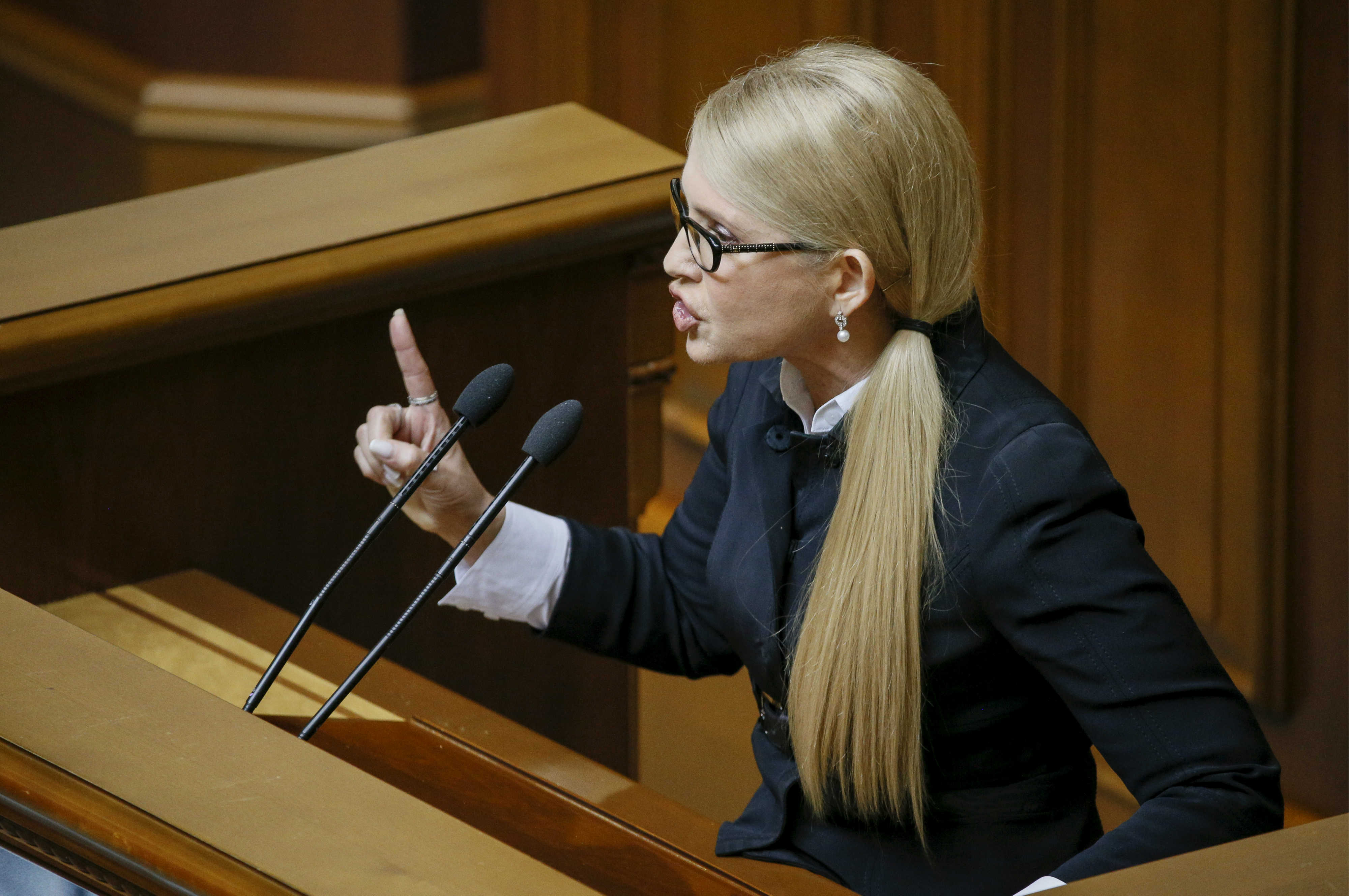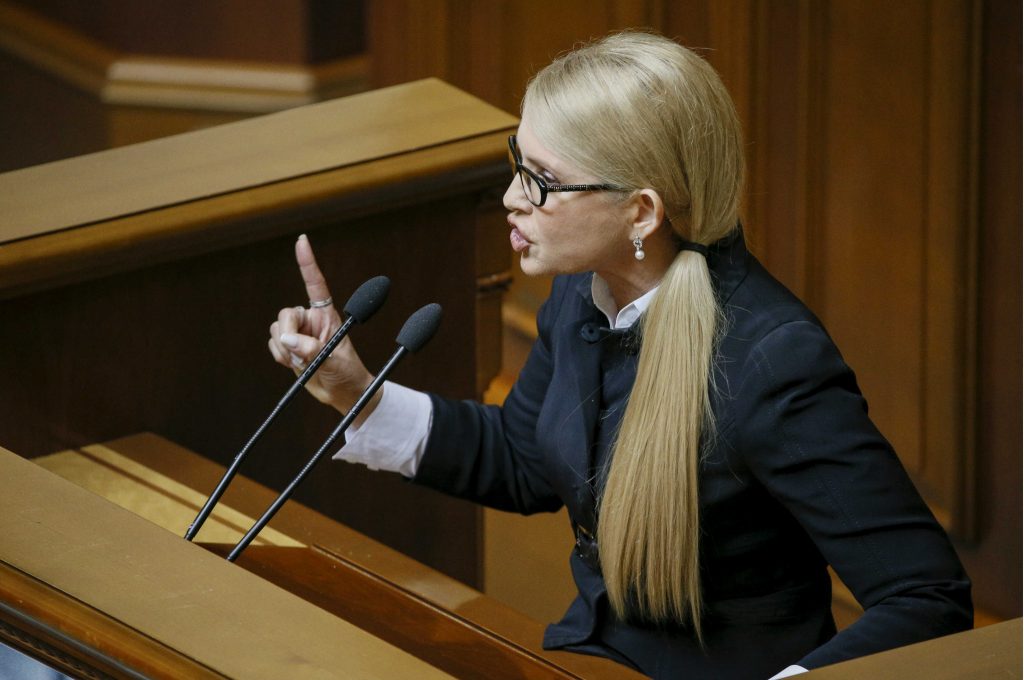 Ukrainians are starting to show greater confidence in the economy, while public trust in the country’s leaders has reached new lows, according to a recent poll from the International Republican Institute. Only 18 percent of those surveyed has a favorable opinion of President Petro Poroshenko, while 76 percent holds an unfavorable opinion. Approval figures for Prime Minister Volodymyr Groisman are similar, while former Prime Minister Arseniy Yatsenyuk has an even worse balance: only 9 percent of respondents approve of his work.
Ukrainians are starting to show greater confidence in the economy, while public trust in the country’s leaders has reached new lows, according to a recent poll from the International Republican Institute. Only 18 percent of those surveyed has a favorable opinion of President Petro Poroshenko, while 76 percent holds an unfavorable opinion. Approval figures for Prime Minister Volodymyr Groisman are similar, while former Prime Minister Arseniy Yatsenyuk has an even worse balance: only 9 percent of respondents approve of his work.
Somewhat surprisingly, populist opposition leaders also face low approval numbers. Only 22 percent of respondents have a favorable opinion of Yulia Tymoshenko. Figures are the same for Oleg Lyashko, and are even worse for Opposition Bloc leader Yuriy Boyko. Whether in power or in opposition, Ukrainian politicians signify corruption and the old ways to doing things to their voters.
These polling numbers illustrate that the main enemy of Ukraine is not populism but corruption—a system of impunity that undermines Ukrainians’ trust in the future of their country. In the same survey, 52 percent of respondents named corruption as one of the three most important issues for Ukraine. Only the military conflict in the Donbas was viewed as more significant.
The fight against corruption is the most important battleground for reform. This is the core of what Hughes Mingarelli, head of the EU Delegation to Ukraine, was referring to when he called Ukraine “a cash machine for ten people” for twenty-three years. That is why the current case of former MP Mykola Martynenko, who for decades was in the business of siphoning money from state-owned enterprises, is so important.
When Ukrainians say that corruption is a bigger issue than low wages, it is because they understand that corruption kills economic growth.
The first reason is obvious: a lack of investment. A recent survey of foreign investors by Dragon Capital and the European Business Association shows that corruption and a lack of trust in the judiciary are the two top obstacles to investment—above Russian military aggression. In 2015, investment as a share of Ukraine’s GDP was under 15 percent, a historic low. It grew in 2016 due to that low base, but there was no real surge in foreign direct investment. And without foreign capital, Ukraine will be unable to use the opportunities provided by the EU-Ukraine Free Trade Agreement and will not see significant export-led growth.
The second reason is even more worrying. When citizens feel a lack of economic options due to low wages and a deep-seated culture of corruption, they move abroad. Between 2013 and 2016, Polish work permits issued to Ukrainians rose from 20,290 to 107,642, while temporary work registrations rose from 217,571 to 1,163,341, growing fastest in 2016. The key reason was not the military conflict in the Donbas, which occurred earlier; it was Ukraine’s economic decline of over 16 percent in 2014-15, the national currency’s depreciation, and a deep lack of trust in the government that started in mid-2015.
These trends are directly linked to politicians’ inability to destroy the corrupt system. It works through a bad business climate—e.g., cases of racketeering by officials—and low morale, when people start thinking, “This country has no future.”
But there is a silver lining: successful independent institutions can have a tremendous impact on economic development and the well-being of Ukrainians. Ensuring a level playing field could push economic growth to the 5-7 percent level that is needed to revive the economy and society’s morale.
After the National Anti-Corruption Bureau of Ukraine (NABU) and the Special Anti-Corruption Prosecutor were created as independent institutions as a result of pressure from international partners and Ukrainian civil society, this system started to crack. Now the main battle is not about industrial or fiscal policy, pension reform or land reform, but whether society will finally be able to break this ingrained system of corruption.
To maintain the momentum of reform, policymakers need to preserve NABU’s independence by selecting genuinely independent international auditors to monitor its performance. And they need to build on the independence of anticorruption institutions by establishing an Anti-Corruption Court from scratch and giving NABU the right to wiretap. The example of Romania where wiretapping allowed the Anti-Corruption Directorate to uncover networks of corrupt officials and businesspersons shows that it is crucial to make anticorruption investigations as effective as possible.
To assist this process, Ukraine’s international partners should focus on preserving and ensuring the independence and efficacy of the country’s key institutions. This will result in more sustainable reforms and protection against populism by depoliticizing decisions of these institutions. This includes not only anticorruption bodies but also the National Bank of Ukraine, the National Commission for State Regulation of Energy and Public Utilities, and the Anti-Monopoly Committee. And the most important institutions, of course, are the courts, as they have the final say in any dispute.
Hlib Vyshlinsky is executive director of the Kyiv-based Centre for Economic Strategy and a council member of the Reanimation Package of Reforms coalition. He tweets @hlib.
Image: Ukrainian former Prime Minister and leader of Batkivshchyna (Fatherland) party Yulia Tymoshenko speaks during a parliament session in Kyiv, Ukraine, March 29, 2016. REUTERS/Gleb Garanich
